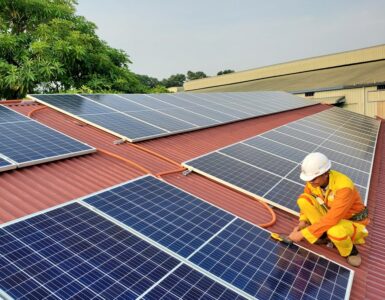With climate change coming grabbing more attention with every season of record high temperature, growing air pollution, wildfires, floods, and cyclones it’s becoming clear that we need major actions to mitigate the impacts of climate disasters.
Globally economies are trying hard to find solutions and each country is assessing its own emissions to understand the seriousness of the situation.
India is not far behind, the country has set an ambitious goal of 450 GW of renewable energy by 2030. In addition, the country has created initiatives to develop the electric vehicles market, alternative fuels, and is also strengthening its partnership with other countries of the world.
The need to embrace sustainability as a development framework is not just for the governments, society also needs to contribute. As countries prioritize climate change in their own economic planning, powerful multinationals also need to ensure that they adopt their own climate-friendly targets.
“Over the past few years, more than 1,500 companies with combined sales of more than $11.4 trillion have made net-zero commitments.” – Brad Smith, Microsoft President, in WSJ
We are seeing a slew of companies declaring their own commitments towards a sustainable future, including the ones from India.
Indian companies are making their own climate commitments and leveraging next-generation solutions, from hydrogen-based steel manufacturing to developing next-gen carbon capture and energy storage technologies.
Let us look at some climate commitments by Indian companies and business conglomerates.
Tatas
India’s leading and most diverse conglomerate – Tata has a presence in a range of industries and many of them have carbon-emitting plants.
The good news is that all the key companies from the group – steel, power, automobiles, chemicals, hospitality, consumer businesses, information technology have either committed to net-zero carbon emissions or are being encouraged to decarbonize their manufacturing & operations.
One of the major decisions came when Tata Power in 2019 announced to stop any new coal-fired power plants and achieve targets of 70% of power generation through renewable sources by 2025.
Tata Motors is expanding its range of electric vehicles and investing in non-fossil energy sources to fuel its own demands. Heavy polluting Tata Chemicals and Tata Steel are investing in energy efficiency projects, pumping in efforts to reduce CO2 emissions, and also developing carbon capture techniques.
Tata Steel with support from Carbon Clean has adopted a 5 tonnes per day (TPD) carbon capture plant at its Jamshedpur factory. The carbon capture plant is the first-of-its-kind in the world within the steel industry that extracts CO2 directly from the Blast Furnace gas. Tata Steel will reuse the captured carbon dioxide to promote the circular carbon economy.
Reliance
The Mumbai headquartered company has a major presence in the pollution-causing energy & petrochemical business. Reliance operates the world’s largest single-location oil complex at Jamnagar in the western Indian state of Gujarat.
In 2020, Reliance Industry announced its ambition to become net carbon zero by 2035. Over the next 15 years, the company plans to strengthen its capability in converting its carbon dioxide emissions into recyclable products and working on carbon capture and storage technologies.
In 2021, Reliance made a significant announcement of starting a new green energy business at its 44th annual general meeting. The new entity plans to invest over $10 billion (Rs 75,000 crores) over the next 3 years.
Mahindra
The Mahindra Group operates across a diverse range of sectors – automobiles, information technology, financial services, agribusiness, vacation ownership, etc – has committed to becoming carbon neutral by 2040.
To reduce the carbon footprint, Mahindra was the first Indian company to announce an internationally benchmarked carbon price ($10/ton CO2) to fund green investments internally.
The company has also taken emission targets which are approved by SBTi (Science Based Targets initiative). Some of the solutions that the company has invested in to combat climate change are smart grid, waste management systems, electric vehicle charging systems, and technology-based tools.
ITC
ITC is a diversified conglomerate, having a presence in FMCG, tobacco, hospitality, agriculture, and paper.
The company FMCG and tobacco business is heavily dependent on raw materials from the agriculture sector. Hence the huge focus of ITC is on adopting sustainable agriculture practices and climate-smart farming practices – water-saving irrigation devices, organic pesticides and fertilizers, mechanization appropriate for small plots, etc.
More than 40% of the company’s energy consumption is met from renewable sources. ITC ESG* scores are one of the best among the large Indian companies, it is rated AA according to Morgan Stanley Capital International’s (MSCI) ESG ratings. The only other Indian company that has an AA rating is Tata’s technology company and leading IT service company Tata Consultancy Services.
Wipro
On the occasion of Earth Day 2021, IT services major Wipro announced its commitment to achieving Net-Zero Greenhouse Gas (GHG) emissions by 2040. The company plans to achieve these goals by bringing energy efficiencies, using renewable energy, and leveraging technology expertise.
HDFC
India’s leading private sector bank, HDFC has committed to becoming carbon neutral by 2031-32.
Mumbai’s headquartered bank is looking to reduce its emissions by bringing efficiencies in energy usage and water consumption. The Bank will include the use of renewable energy like solar panels in its branches and large offices. The Bank will also offer loans for products like electric vehicles and green buildings at lower interest rates. The Bank is also working on a framework for issuing green bonds.
Other Indian companies that have made their own decarbonization strategies are State Bank of India (SBI), Dalmia Cements, Ambuja Cements, Arcelor Mittal, Nippon Steel, Essar Oil & Gas Exploration & Production, JSW Group, Sun Pharma, and Vedanta Ltd.
Following the declaration, the private companies will develop an annual report detailing their contributions and submit it to India’s environment ministry.
Government-owned Indian Railways have also committed to achieving net-zero carbon emissions by 2030. Railways plans to leverage solar energy for meeting all its energy consumption needs by 2030. Already around 1000 Indian railway stations have been solarised and additionally a plan is in place to utilize its vacant land to install more solar plants.
Though India has so far not committed to the ‘net zero emission’ target as its national goal. The climate commitments by Indian companies augurs well for India’s own renewable energy goals.
The net-zero announcements and voluntary pledges by the Indian companies to move towards carbon neutrality can go a long way to inspire other smaller businesses and individuals in society.
*ESG – Environment, social, and corporate governance
ESG ratings are indexes covering aspects such as climate crisis, sustainability, human rights, and consumer protection.









Add comment